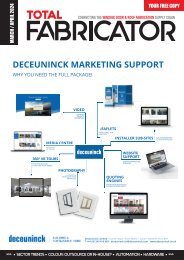August 2018
You also want an ePaper? Increase the reach of your titles
YUMPU automatically turns print PDFs into web optimized ePapers that Google loves.
Insurance Focus<br />
PROJECT POLICIES: CONTRACTORS,<br />
MAKE SURE YOU’RE COVERED...<br />
By Ian Hollingworth, Head of Claims for ECIC.<br />
The High Court’s recent decision that a<br />
roofing firm that caused a fire at a high<br />
school in London was not protected by a<br />
project policy has raised some serious questions<br />
over the reliance by sub-contractors on these<br />
types of insurance policies. This could expose<br />
contractors and subcontractors to higher risks –<br />
in particular smaller sub-contractors working on<br />
large contracts could be vulnerable as a result of<br />
this ruling.<br />
Traditionally, employers on larger construction<br />
projects take out a project policy to cover damage<br />
to the existing structure and possibly the contract<br />
works being undertaken by the sub-contractors<br />
appointed to work on site.<br />
“The project policy<br />
insurer dealt with the<br />
property loss, but then<br />
sought to recover their<br />
outlay from the<br />
contractor that caused<br />
the loss”<br />
As this type of policy would usually provide<br />
protection to named contractors and sometimes<br />
all contractors in the contractual chain, it<br />
provides peace of mind that in the event of a fire<br />
or some other damage caused by contract<br />
workers on site, the project policy would step in.<br />
In the event of damage to the property, the project<br />
policy insurer would simply cover the loss rather<br />
than each sub-contractor going to their own<br />
insurers to recover the cost of their own damaged<br />
contract works.<br />
This avoids lengthy and often costly litigation<br />
between various contractors who could be<br />
blamed for causing the damage<br />
to the building.<br />
The project policy avoids all of<br />
this and ensures the property<br />
and works are adequately covered<br />
to avoid lengthy delays in the<br />
completion of the construction.<br />
Terms of the sub-contract<br />
However, in a recent case, (Haberdashers’ Aske’s<br />
Federation Trust Ltd v Lakehouse Contracts Ltd<br />
and others [<strong>2018</strong>] EWHC 558 (TCC)), the High<br />
Court found roofing firm CPR wasn’t protected by<br />
the project policy because the terms of the subcontract<br />
required that they should maintain their<br />
own insurance.<br />
Usually a construction contract would contain an<br />
insuring clause requiring the individual subcontractor<br />
to take out insurance to cover their<br />
own contract works along with Employers Liability<br />
and Public Liability. This is even if there is a<br />
project policy in place.<br />
The difference with this case was that the project<br />
policy insurer dealt with the property loss, but<br />
then sought to recover their outlay from the<br />
contractor that caused the loss.<br />
This was unusual as a project policy is usually<br />
taken out in joint names – the policyholder and all<br />
sub-contractors; this previously meant the project<br />
policy insurer could not seek a recovery as<br />
essentially all sub-contractors would be considered<br />
a policyholder and covered under the policy.<br />
Notably in this instance, the Court allowed the<br />
project insurer to recover the loss from the subcontractor.<br />
This was on the basis that the main<br />
construction contract had required that the subcontractor<br />
take out their own insurance. In addition,<br />
the sub-contractor was not named at the<br />
commencement of the<br />
construction project and therefore<br />
not factored into the cover by the<br />
project policy insurer when the policy was<br />
taken out.<br />
This ruling has really called into question the<br />
effectiveness of project insurance. It has wide<br />
ramifications for contractors as they can no longer<br />
rely upon a project insurer to pick up a loss in the<br />
event of damage they have caused to a property.<br />
It’s essential, therefore, that they ensure adequate<br />
cover is taken out to cover their potential<br />
liabilities. Seeking the advice and support of an<br />
insurance broker is highly recommended.<br />
Additionally, the insurers of sub-contractors can<br />
no longer rely on the existence of a project policy<br />
to cover a loss. This could mean higher insurance<br />
claims which may have a knock-on effect in<br />
premium increases.<br />
Now, more than ever, it is important for subcontractors<br />
to understand the risks attached to<br />
their works and the potential losses they could<br />
face if they don’t ensure adequate insurance<br />
cover is in place for any eventuality.<br />
Contact ECIC<br />
0330 221 0250<br />
www.ecic.co.uk<br />
Left: Ian Hollingworth, Head of Claims<br />
for ECIC.<br />
“The insurers of subcontractors<br />
can no<br />
longer rely on the<br />
existence of a project<br />
policy to cover a loss”<br />
24 TC AUGUST <strong>2018</strong>

















